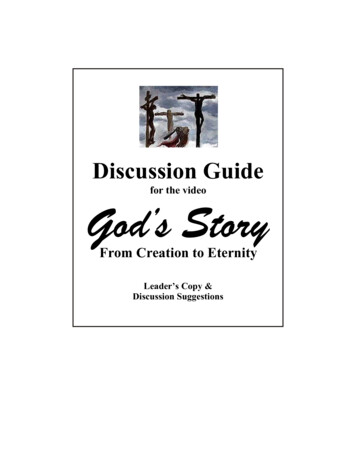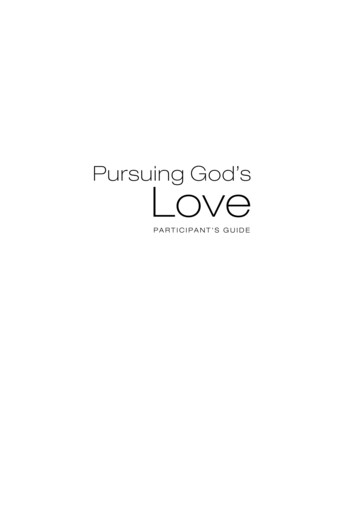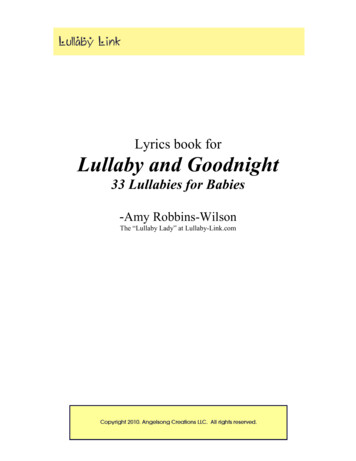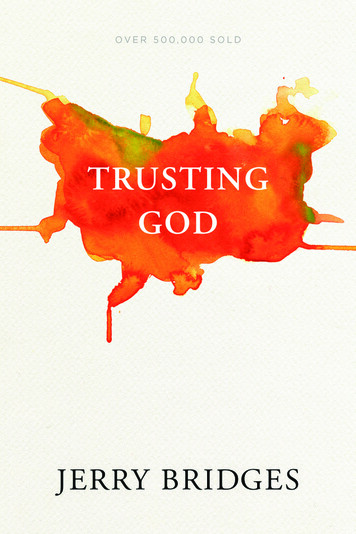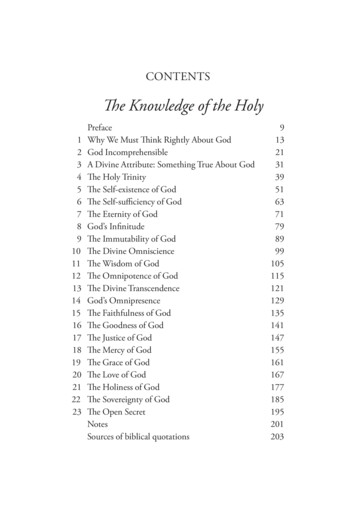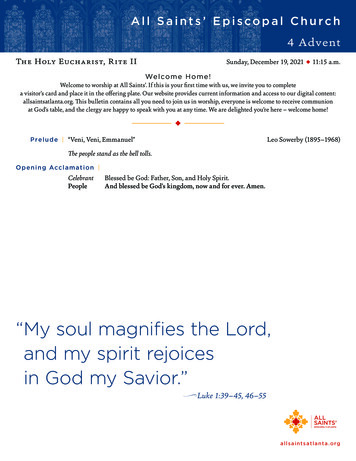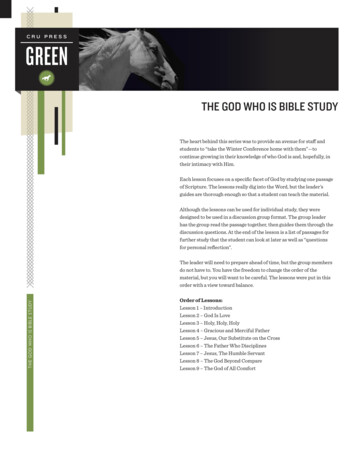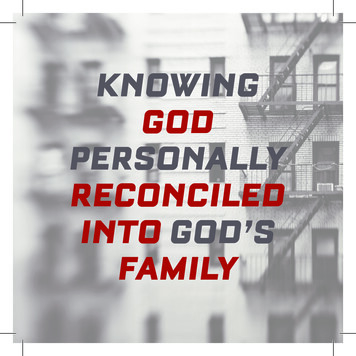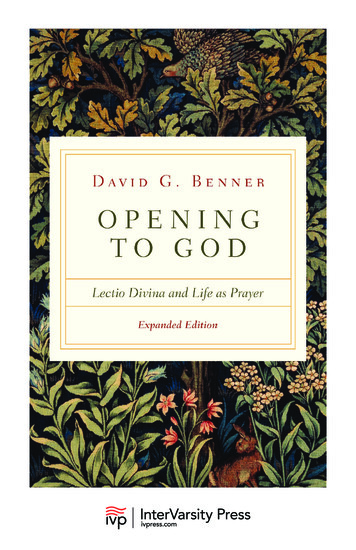
Transcription
Taken from Opening to God, ex. ed., by David G. Benner.Copyright 2010 by David G. Benner.Afterword and appendix copyright 2021 by David G. Benner.Published by InterVarsity Press,Downers Grove, IL. www.ivpress.com.
1MOR E T H A N YOUCA N IM AGINEi f w e a r e h o n e s t , m o s t o f u s h av e to admit that prayeris often more of an obligation than something arising spontaneously from desire. Part of the reason for this, I think, is thatprayer is frequently presented as a spiritual discipline. Disciplines are things that we do not naturally do but feel we shoulddo because they are supposed to be good for us. As you willhave noticed, most children don’t need to be told to play. It isonly adults for whom play as a discipline might be necessaryand potentially helpful! However, as we will see, prayer is thenatural language of the soul. So there is something seriouslywrong when it feels like something we should do.But our problem is deeper than merely thinking of prayer assomething we should do. The real problem and the core of themisunderstanding lies in thinking of prayer as something thatwe do. Understood more correctly, prayer is what God does inus. Our part has much more to do with consent than initiative.That consent, as we shall see, is most simply saying yes to God’sinvitation to loving encounter.OpeningToGod ExEd 15February 1, 2021 12:43 PM
16 O pe n i ngtoG odPrayer is so much more than we could ever imagine becauseGod is so much beyond what we can ever contain in our understanding—even in our imagination. This is why the apostlePaul prayed to the God who, “working in us, can do infinitelymore than we can ask or imagine” (Ephesians 3:20). And it iswhy Jesus, in the Sermon on the Mount, encourages us to thinkof the incredible beauty of a field of wildflowers when we worryabout what to wear (Matthew 6:25-34). His point is that sincenot even Solomon was clothed in regalia as splendid as thosewildflowers, we should trust that, since this is how God clothesthe grass in the field, God’s care for us will be even more unimaginably extravagant.Prayer includes saying things to God—either silently orvocally, whether this be worded petitions or intercessions thatwe put together ourselves or formal prayers that have beenwritten by others. But it is so much more than this. It can alsoinclude reading a passage of Scripture and listening for God’s personal word to you in it meditatively walking the stations of the cross lighting a candle in church or your home allowing music to draw your spirit toward God’s Spirit affirming your beliefs by reading or reciting the creeds reviewing your day and noticing where and how God waspresent to you in it meditating on Scripture and thinking about its meaning foryour life fingering beads as a framework for meditationOpeningToGod ExEd 16 February 1, 2021 12:43 PM
17More Than You Can Imagine allowing your hunger during a fast to draw your attentiontoward God recalling your blessings and responding with gratitude subvocal repetition of a mantra (e.g., “Come, Lord Jesus” or“My God and my all”) that moves prayer from consciousnessto the unconscious and from mind to heart* celebration of the Eucharist (Communion) going for a long, rambling walk while repeating the JesusPrayer (“Lord Jesus Christ, Son of God, have mercy uponme, a sinner”) confessing your sins and asking for forgiveness smelling incense during a liturgy and having your spiritdrawn toward God a contemplative walk in the forest that moves you from selfpreoccupation to God consciousness making the sign of the cross or bowing before an altar orcrucifix sitting in silence—allowing your heart to be drawn back toGod by the periodic gentle repetition of a love name forGod reading liturgical or other written prayers meditatively speaking the Lord’s Prayer attending to your breathing—drawing in God with each*I discuss mantra prayers in chapter seven. But in case you are surprised to see thisterm applied to a form of Christian prayer, I should quickly say that, as we will discover, these prayers are Christian in content even if the form is most commonly associated with non-Christian religions. They are a deeply Christian way of beingprayerfully open to God.OpeningToGod ExEd 17 February 1, 2021 12:43 PM
18 O pe n i ngtoG odinhalation and releasing God to the world with each exhalation allowing your mind and spirit to turn toward God as youhear church bells or see a lit candle or any of an infinitenumber of reminders that can call your attention back toGod singing or pondering the words of a favorite hymn or song meditating on an icon or a work of biblical art allowing your heart to soar in unworded praise in responseto a sunset, a storm, a flower or a treeSome of these may seem strange to you, possibly so far outside your spiritual comfort zone that you may wonder if theyare worthy of being called Christian prayer. But all have beenrichly rewarding for Christians across the major divisions ofthe church and across the centuries of Christian history. Alltherefore are Christian forms of prayer, and because of this allhave much to teach the person who desires to be attentive andresponsive to God.However, it is very important that we acknowledge that noneof these things is automatically prayer. Nor, even, is addressingwords or thoughts to God automatically prayer. But all thesethings—actually, all of life—can be prayer when offered to Godin faith and with openness. It is the underlying orientation ofthe heart that makes something prayer. Without a heart that isopen to God in faith, it may look like prayer and it may soundlike prayer, but it won’t be genuine Christian prayer. Genuineprayer always begins in the heart and is offered by an act ofopening our self as we turn toward God in faith.The ways God can communicate with us are infinitely morecreative and diversified than we could ever imagine. Because ofOpeningToGod ExEd 18 February 1, 2021 12:43 PM
More Than You Can Imagine19this, the ways we can communicate with God are correspondingly broader and richer than most of us ever experience.Growth in prayer is learning to open more and more of ourselves to God.PR AYER AS CONVERSATIONBut what is prayer? The answer I was given as a young child wasthat prayer is a conversation with God. To encourage me topractice such conversational prayer, my parents gave me myfirst book on prayer for my thirteenth birthday. It was calledPrayer: Conversing with God, and in it I learned that prayer couldbe as simple as speaking, silently or audibly, to God—just as Idid to other people.1 This was quite a powerful awareness. Itbecame the foundation of a practice that has served me extremely well since then, the practice of frequently talking withGod as I go through my day. Often this is a quick prayer of intercession, asking God to bless someone who comes to mind orwhom I encounter. Or it may take the form of a few words ofgratitude as I become aware of some blessing—like, for example, just now as I thanked God for my parents, who gave methat book on prayer, and for its author, who taught me so much.Sometimes it involves only a single word—Help! But, regardlessof its length or content, what I have learned through conversational prayer is that my relationship with God is strengthenedas I speak with God throughout the day because it reminds methat I am, in fact, in relationship and that God is with me nomatter where I am or what I am doing.I must say, however, that it took me a long time to begin totruly treat the interaction as conversation. For decades myprayers were nothing more than a monologue. I did all the talking, and I never once considered that God might be doing moreOpeningToGod ExEd 19 February 1, 2021 12:43 PM
20 O pe n i ngtoG odthan listening. The problem was not with my understandingof prayer, but that I didn’t take it seriously enough. If I hadreally believed that prayer was conversation, I would not havebeen nearly as rude as I was. I would have talked less andlistened more.The good news is that God is ever reaching out in selfrevealing love and has no more ceased being Revelation thanbeing Love. The prayer conversation always begins with God.It does not begin with us. Prayer is our response to a divineinvitation to encounter. The prayer conversation has alreadybegun because God has already reached out, seeking our attention and response. Until we learn to attend to the God whois already present and communicating, our prayers will neverbe more than the product of our minds and wills. But prayerhas the potential to be so much more. It can be the responseof our spirit to God’s Spirit as we open the totality of our being to the God who resides in our deep center and longs tomeet us there.The problem with understanding prayer as conversation isthat prayer is so much more than communication. Reducing itto conversation makes it simply a mental activity—words andthoughts being a product of the left hemisphere of the brain.Prayer includes the mind, but is not limited to it. God invitesengagement with more of our brain and more of our being. Theglorious truth is that I can be praying to God without speakingto God, or without even consciously thinking of God. If thiswasn’t true, how could we ever hope to realize the ideal of continuous prayer that is encouraged in Scriptures (1 Thessalo nians 5:17; Ephesians 6:18)? Obviously we cannot be thinkingabout God all the time. Nor can we be talking to God all thetime. But prayer can be as foundational to our daily life asOpeningToGod ExEd 20 February 1, 2021 12:43 PM
More Than You Can Imagine21breathing. It can become a part of living, not just a religiouspractice or a spiritual discipline.PR AYER AS COMMUNIONA better starting point for an adequate understanding of thebreadth of prayer is to view it as communion with God. Communion includes conversation but is much broader. Because itinvolves union, not just closeness and connection, it also entailsmuch more intimacy than mere conversation. We are, as Paulreminds us, in Christ, just as Christ is in us. That language reflects the intermingling that is part of true communion. It doesnot get much more intimate than this—an intimacy that isbased on the reality of a mystical union with Christ, in the present moment, not simply something to be hoped for in the future.Our experiential knowing of this reality may be limited. But theunion is real, even now. And the communion that we can experience in prayer is also real—so real that, more so than anythingelse that I know of, this prayer communion has the power totransform us from the inside out.The good news is that we do not need to be talking to God oreven thinking about God to be in prayer. We can simply bewith God. That is the nature of communion. It is not dependenton constant communication. Think, for example, of being withsomeone you love and with whom you experience deep communion. Words are undoubtedly part of your being together,but notice how easily they can also fall away as you slip into acomfortable experience of simply being together in unwordedpresence. The same can be true of prayer.Love makes this possible, and it is love that makes prayerfulcommunion so fulfilling and transformational. Communionwith God is the answer to our heart’s deepest longings, becauseOpeningToGod ExEd 21 February 1, 2021 12:43 PM
22 O pe n i ngtoG odGod is love. Prayer is a relationship. It is dialogue that is basedon a deep personal encounter. And since God is love, God canonly be truly encountered in love.PR AYER AS BEING IN LOVEWe might say, therefore, that prayer is being in love.2 We canunderstand this in two ways, both of which are true, and eachpoints to the other for its fullest understanding. In the firstsense of this phrase we could say that prayer is being in lovewith God. As noted by John of the Cross, since God is love, Godcan only be known in and through love. Communion with Godleads naturally, therefore, to a deepening of our knowing ofGod’s love for us and, in return, our love for God. But speakingof prayer as being in love also reminds us that in prayer wecome to know our being-in-Love. Prayer is not simply what wedo. It is a way of being. More specifically, it is resting in thereality of our being-in-God. This is our fundamental identity. Itis the hidden but deepest truth of our existence. Our being hasno meaning apart from its relationship to God’s being. The onlypossibility of being who I most deeply am rests in the eternal Iam. Because of the I am, I can be. Because the eternal I am is love,I can experience communion with God in love. This is whatmakes it possible for me to become truly and fully human, forme to become truly and fully who I am in Christ. And doing sohas everything to do with prayer—not simply something I dobut as a way of being in love, being in God.This is why Teresa of Ávila says that the important thing inprayer is not to think much but to love much.3 The head is not abad place to start our prayer journey. But if prayer stays there toolong and does not begin to sink to the heart, it will inevitablybecome arid and frustrating. However, when we allow prayer toOpeningToGod ExEd 22 February 1, 2021 12:43 PM
More Than You Can Imagine23begin to seep from our minds to our depths, it gives God accessto those depths. Then, and only then, can prayer spontaneouslyemerge as God’s action in us. And when it does, prayer becomesthe overflow of the living waters that spring up from our depths.It becomes us listening in on a loving conversation of God withGod as that conversation passes through us.Our relationship with God may not begin in love, but it neverdeepens significantly until we enter into a personal encounterwith Love. The more our being is grounded in God’s love, themore prayer begins to flow from our hearts, not simply ourminds. This is why Paul’s prayer was that we might know thedepths, breadth, length and height of God’s love so that we maythereby be filled with the utter fullness of God (Ephesians3:14-19). Christian prayer is a personal encounter in love, withLove. It is loving communion with the source of all love, withthe source of our very being.Perhaps you have heard the apocryphal story of a man I willcall Juan. Every day near dusk Juan would stop in a church onhis way home from his work—hardhat in hand, often dirty orat least dusty, and obviously tired. He would sit quietly in theback of the church for five or ten minutes, then get up andleave. Seeing him do this day after day, month after month, theparish priest approached him one day as he was leaving andtold him he was happy that he used the church in this way.Juan thanked the priest for leaving the church open so he couldcome in, saying that this was a very important time for himeach day. The priest asked him in what way it was important.Juan replied that this was his time with Jesus. He went on, “Ijust come in, sit down and say ‘Jesus, it’s Juan.’”“What happens then?” the priest asked.“Well,” he replied, “Jesus says ‘Juan, it’s Jesus,’ and we’reOpeningToGod ExEd 23 February 1, 2021 12:43 PM
24 O pe n i ngtoG odhappy to just spend some time together.”Juan may not have known it, but he had come to know theessence of prayer. He loved God and loved to spend time withGod. Prayer is not simply a presentation of petitions, althoughbringing requests to God is certainly a legitimate and important part of prayer. Nor is it a discharge of an obligation.In essence, prayer is being with the Beloved. It is relationship. It is accepting God’s invitation to loving encounter. It is,therefore, more like an echo than a self-initiated action. It iscon sent to God’s action in our hearts and in the depths ofour being.JOURNEYING INTO LOVEAs our love journey with God develops, so does our prayer. Itcannot help but do so because prayer is right at the heart of ourrelationship with God. Prayer is God’s action in us. Our part issimply to allow divine love to so transform our hearts that loveof God will spring forth as a response to love, not as the fruit ofour determination.The route to a life of prayer as loving personal encounterwith God is to allow prayer to be God’s responsibility. We canno more manufacture a genuine encounter with love than wecan transform our hearts of stone to hearts of love. For thesematters we can do no other than turn our face toward God andreceive the love for which our souls so desperately long.The Christian spiritual journey is responding to God’s invitation to personal encounter in love. Prayer is our response.Prayer is the place of the encounter. Growth in prayer is growthin loving intimacy with God.Thomas Green compares the stages of this growth to thestages in the development of a romance.4 The first stage ofOpeningToGod ExEd 24 February 1, 2021 12:43 PM
More Than You Can Imagine25prayer, he suggests, is the courtship—getting to know God.Since we cannot really love what we do not know, a love relationship must start with knowing the beloved. In the case ofknowing God, this might begin with prayerful meditation onScriptures. It might also involve using our imagination to meetJesus in the events of his life on earth and seeing ourselves,with our own concrete personal history, connected to thoseevents. At this stage, the goal of prayer is getting to know theGod who is courting us.The second stage of prayer is the honeymoon. Here we experience a transition from knowledge to experience, from headknowing to heart knowing. Meditation now slowly begins torequire less effort. Our hope begins to be realized and the experience of God begins to flow freely with less meditative labor.We experience joy in just being with the Lord—just as goodfriends find joy simply in being together. They don’t plan theirconversation or analyze their relationship. They don’t reallyeven think about each other much when they are together. Theyare just happy to be together, whatever may be happening. Thisis Juan and his Lord.Following the honeymoon, the third stage is what FatherGreen calls the movement from apparent love to true love. Thiscorresponds to the long years of daily married life. And just asmature marriage relationships involve both a growing friendship as well as periods of deadening routine and at least occasional conflict, so too the prayer journey will inevitably includeboth consolation and desolation. If you don’t know about desolation in prayer, you haven’t been praying for very long. I havecertainly known long periods when it felt like my prayers weresimply echoing in my head but not reaching God. But, as weshall see, even desolation has its divine purpose. For here, inOpeningToGod ExEd 25 February 1, 2021 12:43 PM
26 O pe n i ngtoG odthese periods of dryness in prayer, we can learn to drink deeplyfrom the living water in ways that are not dependent on oursenses. It is in these dark nights that our soul can learn to seeby faith, not by sight.MORE THAN YOU CAN IMAGINEPrayer is more than you could ever imagine, because God is somuch beyond what you can conceive. We are surrounded withgods that are too small to be up to the task of holding our deepest personal longings, never mind the world’s most urgent problems. Our childhood God will never be adequate for thosetasks. The ways of understanding and relating to God that weacquired in home, church and community are often seriouslylimited, sometimes dangerously wrong. This is why it is so important that we allow our views of God to grow and develop.The view of God that counts in this regard is not the officialone you might profess if you are trying to be safely within thelines of orthodox dogma. It is the one that is actually at the coreof your experience of God, the one that underlies your experience of life. This will usually be the God of your childhood. Forgood or bad, this God is usually astoundingly robust—even inthe face of later adult teaching that may demonstrate how incompatible this God is with the one you meet in Jesus. I think,for example, of the many people I know who live under anenormous burden of guilt that is associated with a harsh, punitive deity encountered in their childhood. Nowhere feels safefrom the lurking presence of this God made in the image ofparents or religious authority figures. Perhaps even more common are the large numbers of people—men and women—whohave difficulty relating to a God that seems so inescapably masculine. In both situations prayer will be powerfully shaped byOpeningToGod ExEd 26 February 1, 2021 12:43 PM
More Than You Can Imagine27these views of God that are the residue of childhood teachingand experience—not shaped by the reality of the God who actually invites loving communion.I have been speaking about the love of God and so have already drawn some attention to the implications of groundingour view of God in grace. I will have more to say about this aswe proceed, but let me offer a brief comment on one dimensionof our view of God that has great potential to limit our experience of God—namely, the gender of God. I comment on thismatter not to argue a theological point but, in keeping with thethrust of this book, to draw attention to implications for prayerthat flow from how we view God.I have long been sensitive to the apparently exclusive masculinity of God, not because I had a bad relationship with my fatherbut probably because I had a good relationship with both my father and my mother. My childhood oriented me to a God whowas the source of both males and females and who was imagedby both. However, I related to God as male because the Father, bytitle, made it hard to think of anything else, and Jesus seemedinescapably male—even if far from stereotypically so by eitherfirst- or twenty-first-century cultural standards. This resulted insome intellectual puzzlement about how a gendered God couldbe the source of both males and females, but much more importantly, it left the parts of me that related best and most fully towomen out of my prayer dialogue and divine encounter. Howexcited I was when I discovered the ancient Christian traditionof recognizing in the Spirit the feminine elements of the Godhead. This was far from a mere theological novelty for me. Immediately it began to influence my prayer experience. In the decades since this I have learned to bring more of myself to the Godwho is much more than either male or female, but who containsOpeningToGod ExEd 27 February 1, 2021 12:43 PM
28o pe n i ngtog odboth. Sometimes I pray to the Spirit of God, who I view and relateto as female. But at least as often I pray to the Father or to Jesus,both of whom remain, in my mind, as male.I do not think that the Holy Spirit is female, nor do I thinkthat God the Father is male. God is beyond gender and at thesame time the source of our gendered being. But, as I have allowed my ways of relating to and thinking about God to broaden,my prayer experience has correspondingly become much morethan I could ever have imagined. I do not believe that my ideasof God, or any ideas of God, completely capture or adequatelyrepresent ultimate mystery. That is why I say I am making aspiritual point more than a theological one. And that point isthat God is more than we can conceive, so we need to be carefulto hold our conceptions with humility and gentleness so as toallow our prayer experience to not be limited by them.MAKING IT PERSONALBut enough of my prayer experience. Let’s turn to yours.Perhaps your prayer remains more duty than devotion,more a matter of the head than the heart. Perhaps youknow little or nothing of the sacred romance I have discussed. Don’t be discouraged by this, but just as important, be careful to not allow yourself to become contentwith it. Remember that prayer is more a matter of consent than initiative. Trust that your prayer relationshipwith God has been established by God’s initiative, notyours. Your part is simply making space for God, turning to God with attentiveness and openness. Don’tthink of this as an obligation. Hear it as an invitation toOpeningToGod ExEd 28February 1, 2021 12:43 PM
29More Than You Can Imagineabundant and true life. Hear it as an invitation to theencounter in love that is prayer.Settle for nothing less than knowing God in love. Thisbegins by knowing the depths of God’s love for you. Allof us need to regularly return to this knowing. In fact,you can never get enough of it. Everything else that isrequired of you in life—your love of God, yourself andothers—all flows out of your personal knowing of God’sextravagant love for you.Take a few moments, now or sometime soon, for prayerful reflection on the things presented in this chapter.1. How would you describe your communication withGod? Does conversational prayer—brief bullet prayersthroughout the day—form a part of it? If not, considerif there may be a possibility here for deepening yourrelationship with God. How does God’s communicationto you form part of your dialogue? How might yourprayer experience change if your times of formal prayerincluded more space for listening? What makes it hardfor you to offer this stillness and silence?2. To what extent is your experience of prayer an experience of loving communion with God? Whatthings get in the road of this intimate knowing ofGod’s love? What could you do to get yourself out ofthe way of what God desires to do in your depths tomake prayer as loving encounter more of an experienced reality?OpeningToGod ExEd 29February 1, 2021 12:43 PM
30 O pe n i ngtoG od3. As you read the broad range of things that I suggested are part of Christian prayer, which of themseemed like they might be helpful for you? Perhaps it issomething you already do and simply never thought ofas prayer. What would change if you understood thesemoments as prayer? And what could you do to makespace for more of these moments in your life?4. Take some time to write out your own definition ofprayer. Notice if your understanding of prayer haschanged over the years and how that understandinghas related to your practice of prayer. How did yourchildhood picture of God shape your practice of prayer?And how have any changes in how you understand Godsince then affected your prayer life?5. Finally, if you haven’t done so already, make a particular point of noticing anything in this chapter thatseems to correspond to what the Spirit of God has already been teaching you or where the Spirit has beenleading you. If you do nothing else, pay careful attention to this and respond to any invitations that yousense are coming to you from God. This too is prayerand is a particularly appropriate prayer posture as youcontinue to work through the following chapters.2OpeningToGod ExEd 30 February 1, 2021 12:43 PM
BUY THE BOOK!ivpress.com/opening-to-god
"My God and my all") that moves prayer from consciousness to the unconscious and from mind to heart* celebration of the Eucharist (Communion) going for a long, rambling walk while repeating the Jesus Prayer ("Lord Jesus Christ, Son of God, have mercy upon me, a sinner") confessing your sins and asking for forgiveness
